Business Report on Sharing Economy: Status, Examples and Reflection
VerifiedAdded on 2023/06/14
|16
|3878
|292
Report
AI Summary
This business report provides a comprehensive analysis of the sharing economy, exploring its current status, benefits, and limitations. It includes real-world examples such as Uber and Airbnb to illustrate key concepts. The report delves into the network effects that drive the sharing economy's growth, as well as the challenges it faces, such as multi-homing and legal issues. A case study on Uber highlights the factors contributing to its initial success and subsequent struggles. Additionally, the report discusses the role of crowdsourcing websites like Kickstarter in facilitating the sharing economy by providing funding for innovative projects. The report concludes with a personal reflection on the implications of the sharing economy for businesses and consumers alike, emphasizing the need for a balanced approach that addresses both the opportunities and challenges it presents. Desklib offers a platform to access similar solved assignments and past papers for students.
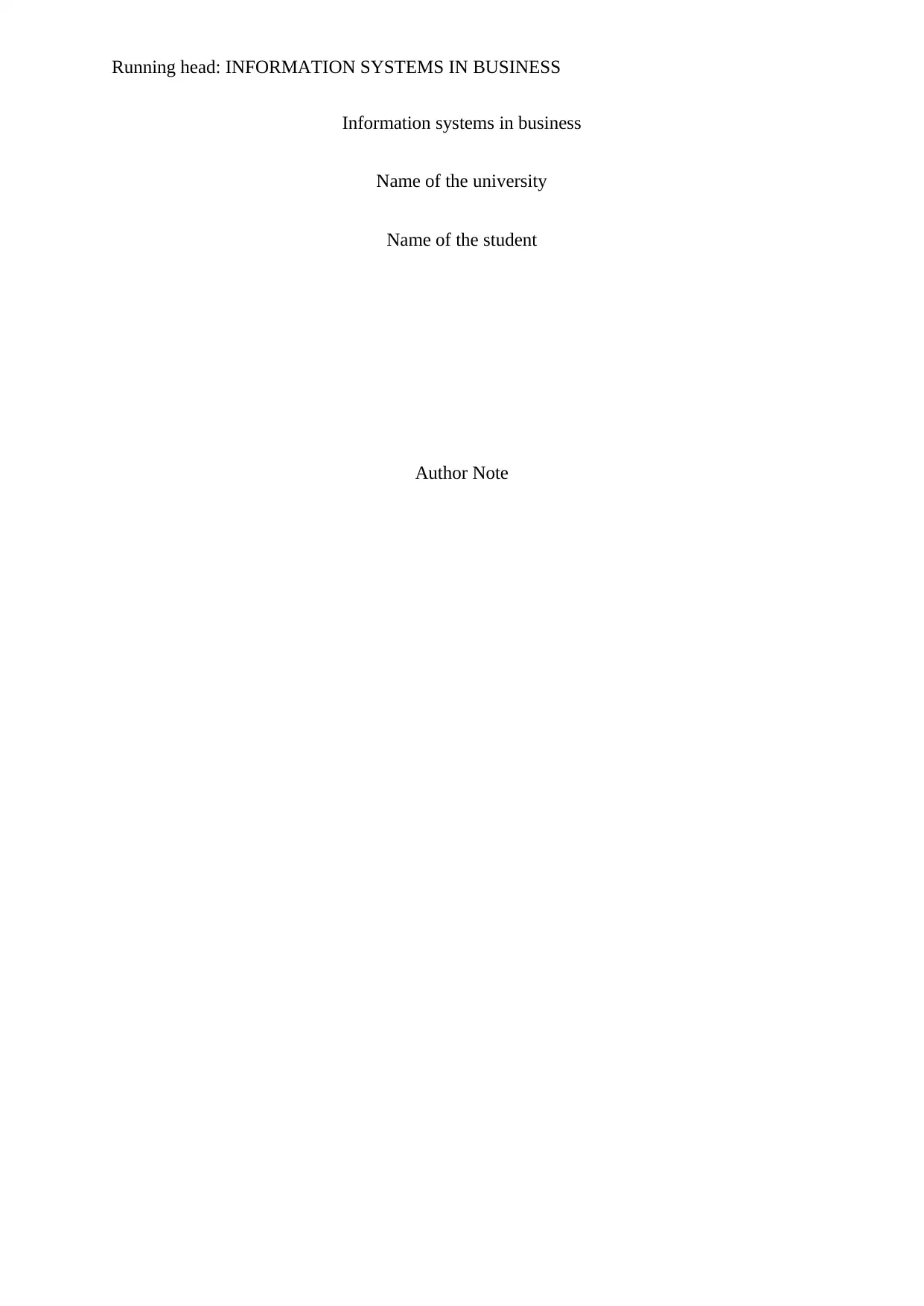
Running head: INFORMATION SYSTEMS IN BUSINESS
Information systems in business
Name of the university
Name of the student
Author Note
Information systems in business
Name of the university
Name of the student
Author Note
Paraphrase This Document
Need a fresh take? Get an instant paraphrase of this document with our AI Paraphraser
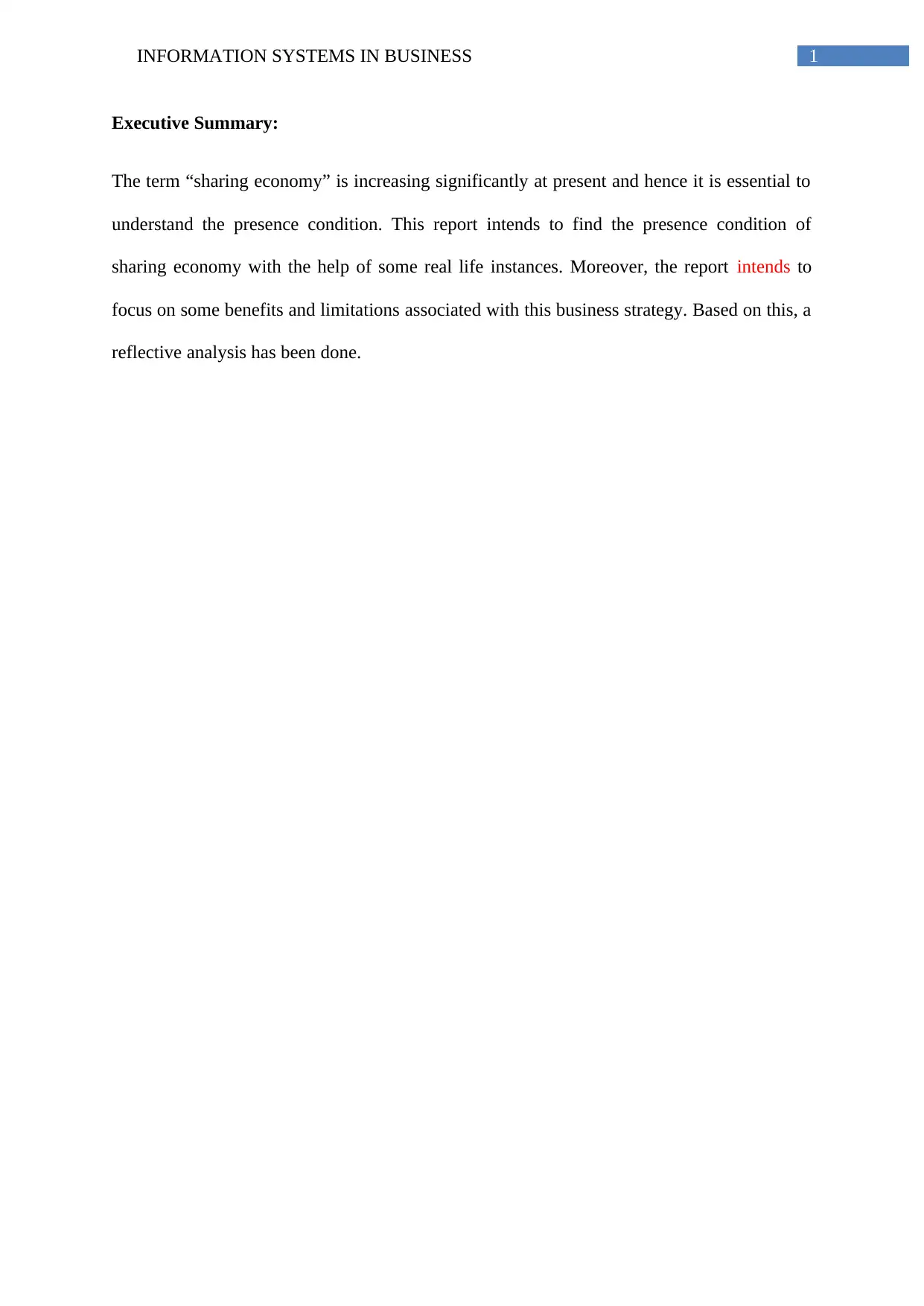
1INFORMATION SYSTEMS IN BUSINESS
Executive Summary:
The term “sharing economy” is increasing significantly at present and hence it is essential to
understand the presence condition. This report intends to find the presence condition of
sharing economy with the help of some real life instances. Moreover, the report intends to
focus on some benefits and limitations associated with this business strategy. Based on this, a
reflective analysis has been done.
Executive Summary:
The term “sharing economy” is increasing significantly at present and hence it is essential to
understand the presence condition. This report intends to find the presence condition of
sharing economy with the help of some real life instances. Moreover, the report intends to
focus on some benefits and limitations associated with this business strategy. Based on this, a
reflective analysis has been done.
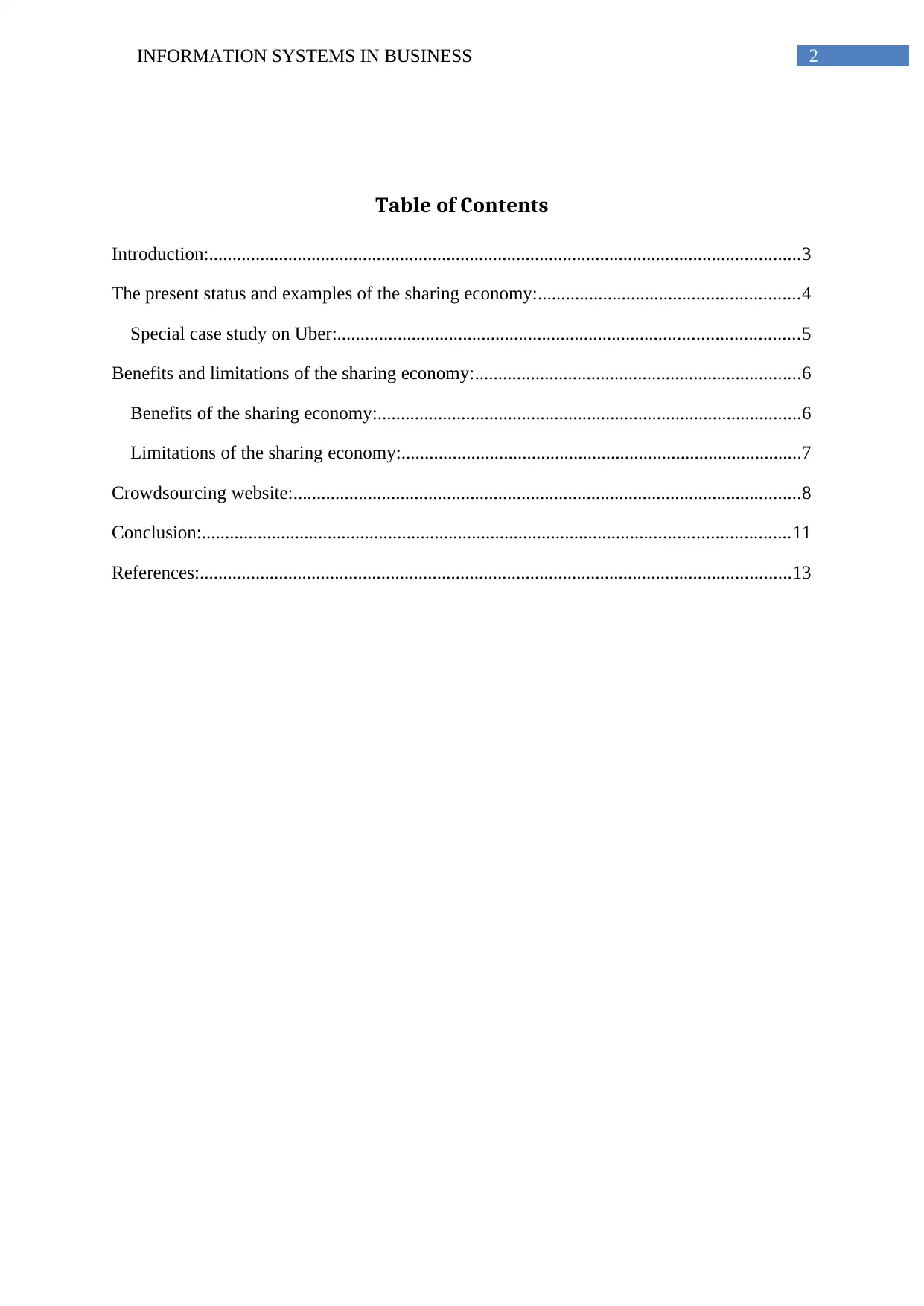
2INFORMATION SYSTEMS IN BUSINESS
Table of Contents
Introduction:...............................................................................................................................3
The present status and examples of the sharing economy:........................................................4
Special case study on Uber:...................................................................................................5
Benefits and limitations of the sharing economy:......................................................................6
Benefits of the sharing economy:...........................................................................................6
Limitations of the sharing economy:......................................................................................7
Crowdsourcing website:.............................................................................................................8
Conclusion:..............................................................................................................................11
References:...............................................................................................................................13
Table of Contents
Introduction:...............................................................................................................................3
The present status and examples of the sharing economy:........................................................4
Special case study on Uber:...................................................................................................5
Benefits and limitations of the sharing economy:......................................................................6
Benefits of the sharing economy:...........................................................................................6
Limitations of the sharing economy:......................................................................................7
Crowdsourcing website:.............................................................................................................8
Conclusion:..............................................................................................................................11
References:...............................................................................................................................13
⊘ This is a preview!⊘
Do you want full access?
Subscribe today to unlock all pages.

Trusted by 1+ million students worldwide
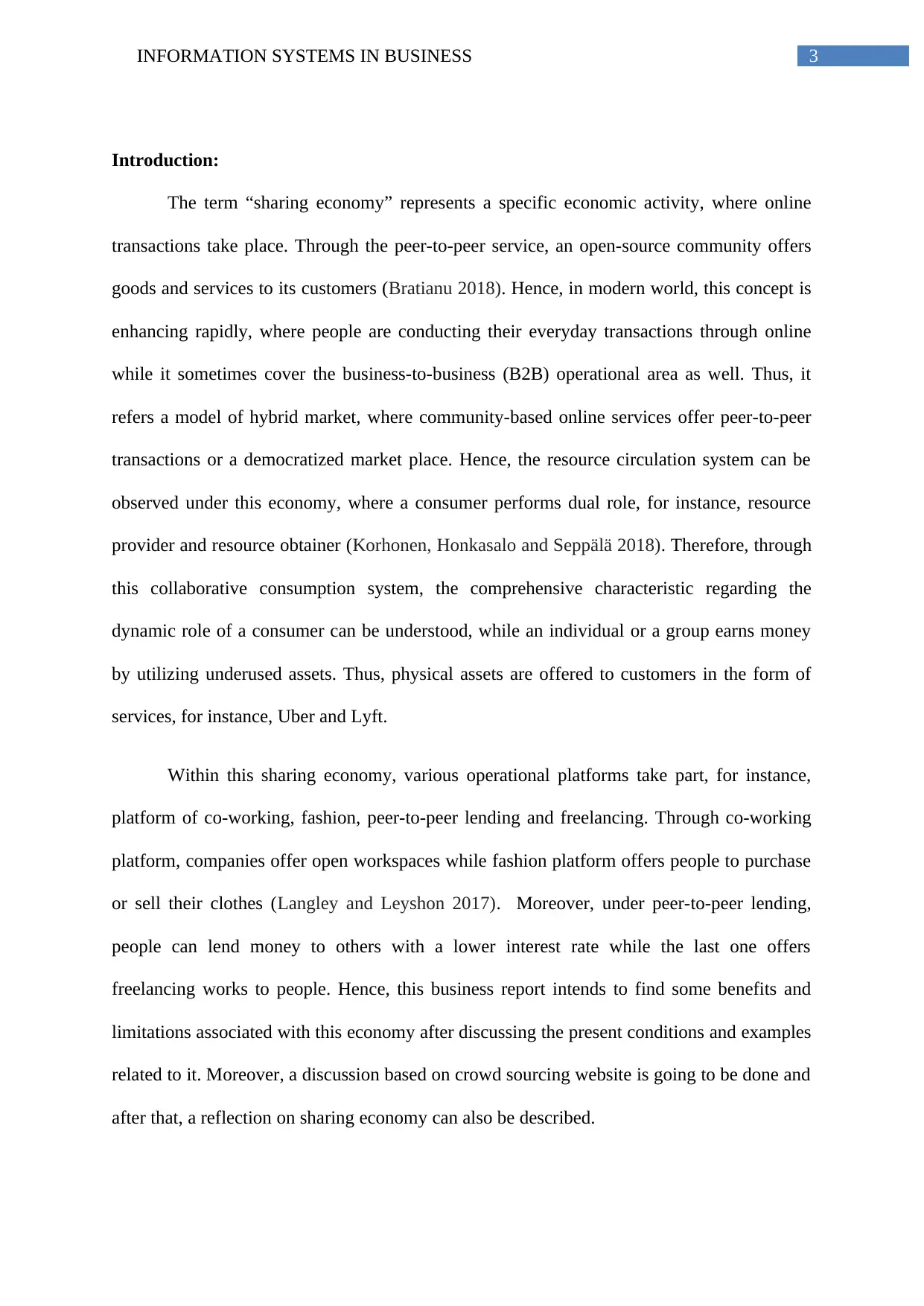
3INFORMATION SYSTEMS IN BUSINESS
Introduction:
The term “sharing economy” represents a specific economic activity, where online
transactions take place. Through the peer-to-peer service, an open-source community offers
goods and services to its customers (Bratianu 2018). Hence, in modern world, this concept is
enhancing rapidly, where people are conducting their everyday transactions through online
while it sometimes cover the business-to-business (B2B) operational area as well. Thus, it
refers a model of hybrid market, where community-based online services offer peer-to-peer
transactions or a democratized market place. Hence, the resource circulation system can be
observed under this economy, where a consumer performs dual role, for instance, resource
provider and resource obtainer (Korhonen, Honkasalo and Seppälä 2018). Therefore, through
this collaborative consumption system, the comprehensive characteristic regarding the
dynamic role of a consumer can be understood, while an individual or a group earns money
by utilizing underused assets. Thus, physical assets are offered to customers in the form of
services, for instance, Uber and Lyft.
Within this sharing economy, various operational platforms take part, for instance,
platform of co-working, fashion, peer-to-peer lending and freelancing. Through co-working
platform, companies offer open workspaces while fashion platform offers people to purchase
or sell their clothes (Langley and Leyshon 2017). Moreover, under peer-to-peer lending,
people can lend money to others with a lower interest rate while the last one offers
freelancing works to people. Hence, this business report intends to find some benefits and
limitations associated with this economy after discussing the present conditions and examples
related to it. Moreover, a discussion based on crowd sourcing website is going to be done and
after that, a reflection on sharing economy can also be described.
Introduction:
The term “sharing economy” represents a specific economic activity, where online
transactions take place. Through the peer-to-peer service, an open-source community offers
goods and services to its customers (Bratianu 2018). Hence, in modern world, this concept is
enhancing rapidly, where people are conducting their everyday transactions through online
while it sometimes cover the business-to-business (B2B) operational area as well. Thus, it
refers a model of hybrid market, where community-based online services offer peer-to-peer
transactions or a democratized market place. Hence, the resource circulation system can be
observed under this economy, where a consumer performs dual role, for instance, resource
provider and resource obtainer (Korhonen, Honkasalo and Seppälä 2018). Therefore, through
this collaborative consumption system, the comprehensive characteristic regarding the
dynamic role of a consumer can be understood, while an individual or a group earns money
by utilizing underused assets. Thus, physical assets are offered to customers in the form of
services, for instance, Uber and Lyft.
Within this sharing economy, various operational platforms take part, for instance,
platform of co-working, fashion, peer-to-peer lending and freelancing. Through co-working
platform, companies offer open workspaces while fashion platform offers people to purchase
or sell their clothes (Langley and Leyshon 2017). Moreover, under peer-to-peer lending,
people can lend money to others with a lower interest rate while the last one offers
freelancing works to people. Hence, this business report intends to find some benefits and
limitations associated with this economy after discussing the present conditions and examples
related to it. Moreover, a discussion based on crowd sourcing website is going to be done and
after that, a reflection on sharing economy can also be described.
Paraphrase This Document
Need a fresh take? Get an instant paraphrase of this document with our AI Paraphraser
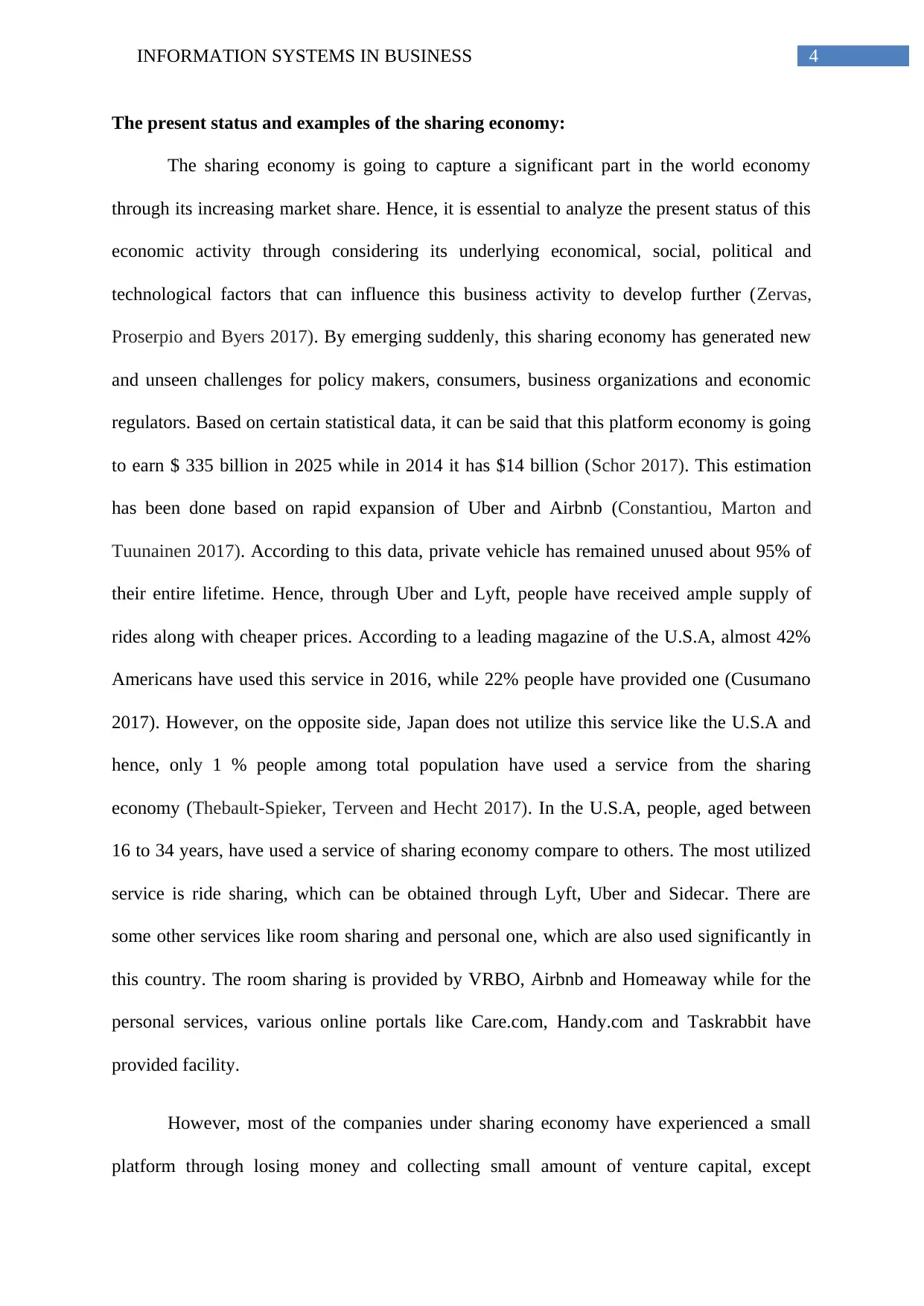
4INFORMATION SYSTEMS IN BUSINESS
The present status and examples of the sharing economy:
The sharing economy is going to capture a significant part in the world economy
through its increasing market share. Hence, it is essential to analyze the present status of this
economic activity through considering its underlying economical, social, political and
technological factors that can influence this business activity to develop further (Zervas,
Proserpio and Byers 2017). By emerging suddenly, this sharing economy has generated new
and unseen challenges for policy makers, consumers, business organizations and economic
regulators. Based on certain statistical data, it can be said that this platform economy is going
to earn $ 335 billion in 2025 while in 2014 it has $14 billion (Schor 2017). This estimation
has been done based on rapid expansion of Uber and Airbnb (Constantiou, Marton and
Tuunainen 2017). According to this data, private vehicle has remained unused about 95% of
their entire lifetime. Hence, through Uber and Lyft, people have received ample supply of
rides along with cheaper prices. According to a leading magazine of the U.S.A, almost 42%
Americans have used this service in 2016, while 22% people have provided one (Cusumano
2017). However, on the opposite side, Japan does not utilize this service like the U.S.A and
hence, only 1 % people among total population have used a service from the sharing
economy (Thebault-Spieker, Terveen and Hecht 2017). In the U.S.A, people, aged between
16 to 34 years, have used a service of sharing economy compare to others. The most utilized
service is ride sharing, which can be obtained through Lyft, Uber and Sidecar. There are
some other services like room sharing and personal one, which are also used significantly in
this country. The room sharing is provided by VRBO, Airbnb and Homeaway while for the
personal services, various online portals like Care.com, Handy.com and Taskrabbit have
provided facility.
However, most of the companies under sharing economy have experienced a small
platform through losing money and collecting small amount of venture capital, except
The present status and examples of the sharing economy:
The sharing economy is going to capture a significant part in the world economy
through its increasing market share. Hence, it is essential to analyze the present status of this
economic activity through considering its underlying economical, social, political and
technological factors that can influence this business activity to develop further (Zervas,
Proserpio and Byers 2017). By emerging suddenly, this sharing economy has generated new
and unseen challenges for policy makers, consumers, business organizations and economic
regulators. Based on certain statistical data, it can be said that this platform economy is going
to earn $ 335 billion in 2025 while in 2014 it has $14 billion (Schor 2017). This estimation
has been done based on rapid expansion of Uber and Airbnb (Constantiou, Marton and
Tuunainen 2017). According to this data, private vehicle has remained unused about 95% of
their entire lifetime. Hence, through Uber and Lyft, people have received ample supply of
rides along with cheaper prices. According to a leading magazine of the U.S.A, almost 42%
Americans have used this service in 2016, while 22% people have provided one (Cusumano
2017). However, on the opposite side, Japan does not utilize this service like the U.S.A and
hence, only 1 % people among total population have used a service from the sharing
economy (Thebault-Spieker, Terveen and Hecht 2017). In the U.S.A, people, aged between
16 to 34 years, have used a service of sharing economy compare to others. The most utilized
service is ride sharing, which can be obtained through Lyft, Uber and Sidecar. There are
some other services like room sharing and personal one, which are also used significantly in
this country. The room sharing is provided by VRBO, Airbnb and Homeaway while for the
personal services, various online portals like Care.com, Handy.com and Taskrabbit have
provided facility.
However, most of the companies under sharing economy have experienced a small
platform through losing money and collecting small amount of venture capital, except
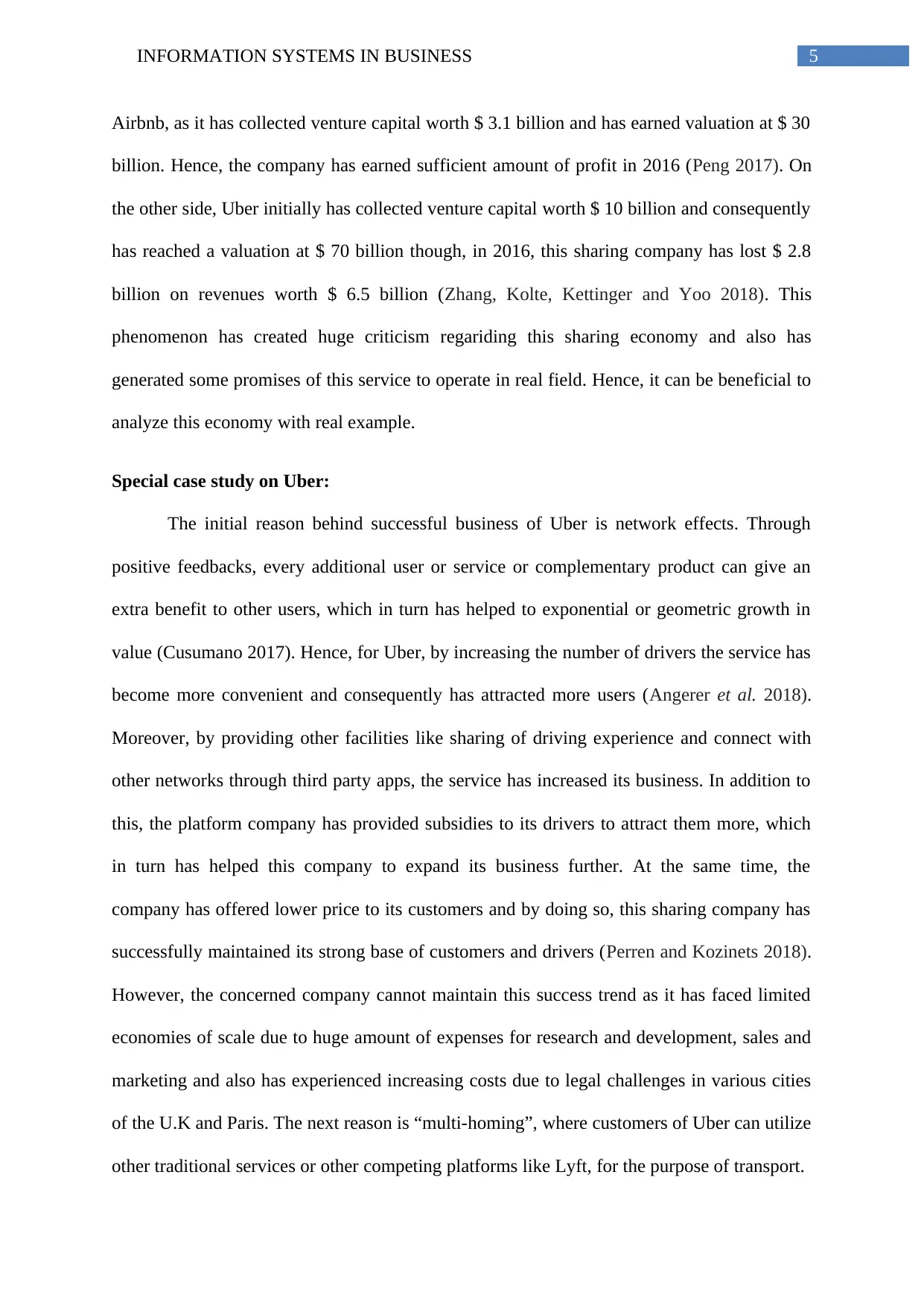
5INFORMATION SYSTEMS IN BUSINESS
Airbnb, as it has collected venture capital worth $ 3.1 billion and has earned valuation at $ 30
billion. Hence, the company has earned sufficient amount of profit in 2016 (Peng 2017). On
the other side, Uber initially has collected venture capital worth $ 10 billion and consequently
has reached a valuation at $ 70 billion though, in 2016, this sharing company has lost $ 2.8
billion on revenues worth $ 6.5 billion (Zhang, Kolte, Kettinger and Yoo 2018). This
phenomenon has created huge criticism regariding this sharing economy and also has
generated some promises of this service to operate in real field. Hence, it can be beneficial to
analyze this economy with real example.
Special case study on Uber:
The initial reason behind successful business of Uber is network effects. Through
positive feedbacks, every additional user or service or complementary product can give an
extra benefit to other users, which in turn has helped to exponential or geometric growth in
value (Cusumano 2017). Hence, for Uber, by increasing the number of drivers the service has
become more convenient and consequently has attracted more users (Angerer et al. 2018).
Moreover, by providing other facilities like sharing of driving experience and connect with
other networks through third party apps, the service has increased its business. In addition to
this, the platform company has provided subsidies to its drivers to attract them more, which
in turn has helped this company to expand its business further. At the same time, the
company has offered lower price to its customers and by doing so, this sharing company has
successfully maintained its strong base of customers and drivers (Perren and Kozinets 2018).
However, the concerned company cannot maintain this success trend as it has faced limited
economies of scale due to huge amount of expenses for research and development, sales and
marketing and also has experienced increasing costs due to legal challenges in various cities
of the U.K and Paris. The next reason is “multi-homing”, where customers of Uber can utilize
other traditional services or other competing platforms like Lyft, for the purpose of transport.
Airbnb, as it has collected venture capital worth $ 3.1 billion and has earned valuation at $ 30
billion. Hence, the company has earned sufficient amount of profit in 2016 (Peng 2017). On
the other side, Uber initially has collected venture capital worth $ 10 billion and consequently
has reached a valuation at $ 70 billion though, in 2016, this sharing company has lost $ 2.8
billion on revenues worth $ 6.5 billion (Zhang, Kolte, Kettinger and Yoo 2018). This
phenomenon has created huge criticism regariding this sharing economy and also has
generated some promises of this service to operate in real field. Hence, it can be beneficial to
analyze this economy with real example.
Special case study on Uber:
The initial reason behind successful business of Uber is network effects. Through
positive feedbacks, every additional user or service or complementary product can give an
extra benefit to other users, which in turn has helped to exponential or geometric growth in
value (Cusumano 2017). Hence, for Uber, by increasing the number of drivers the service has
become more convenient and consequently has attracted more users (Angerer et al. 2018).
Moreover, by providing other facilities like sharing of driving experience and connect with
other networks through third party apps, the service has increased its business. In addition to
this, the platform company has provided subsidies to its drivers to attract them more, which
in turn has helped this company to expand its business further. At the same time, the
company has offered lower price to its customers and by doing so, this sharing company has
successfully maintained its strong base of customers and drivers (Perren and Kozinets 2018).
However, the concerned company cannot maintain this success trend as it has faced limited
economies of scale due to huge amount of expenses for research and development, sales and
marketing and also has experienced increasing costs due to legal challenges in various cities
of the U.K and Paris. The next reason is “multi-homing”, where customers of Uber can utilize
other traditional services or other competing platforms like Lyft, for the purpose of transport.
⊘ This is a preview!⊘
Do you want full access?
Subscribe today to unlock all pages.

Trusted by 1+ million students worldwide
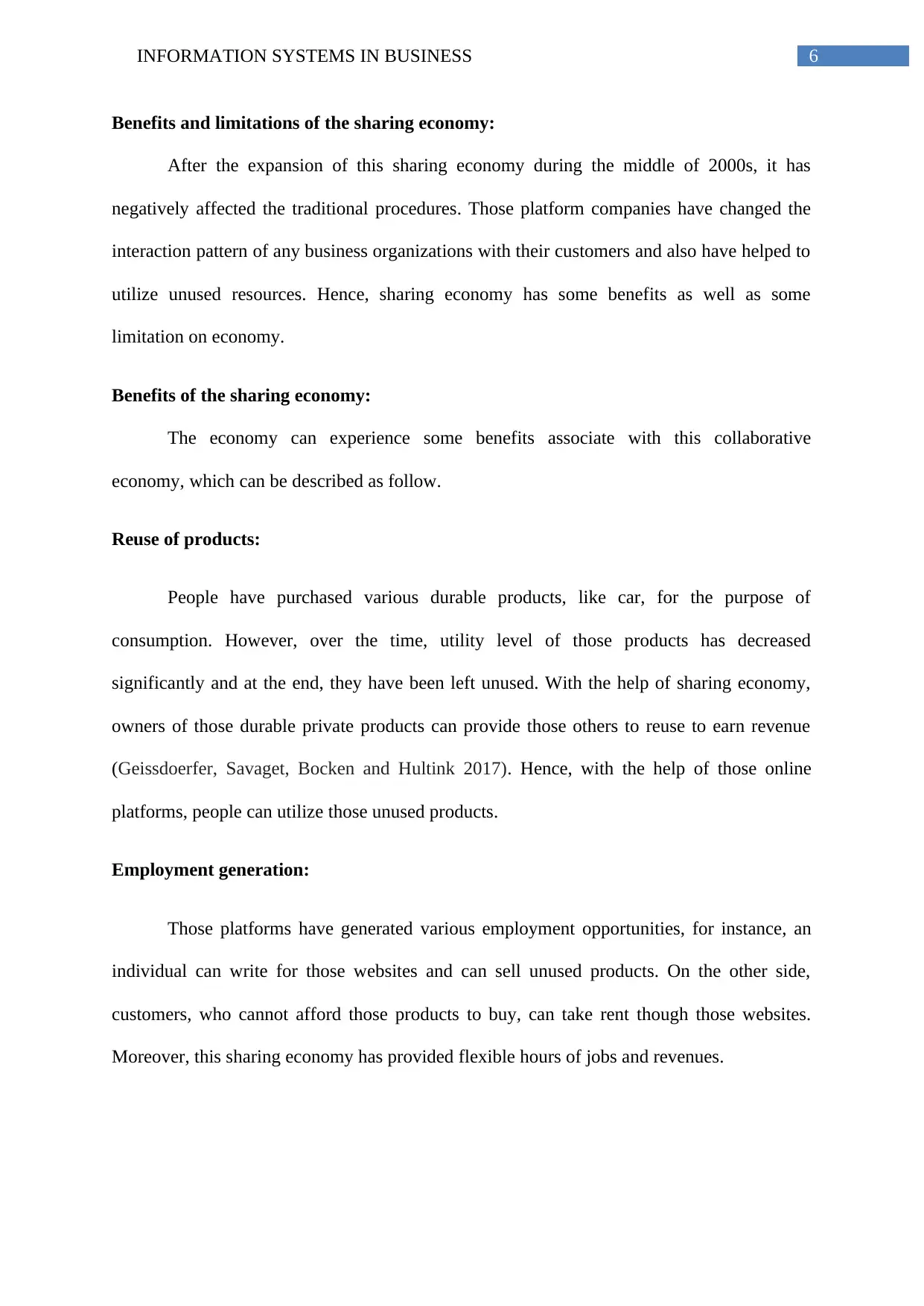
6INFORMATION SYSTEMS IN BUSINESS
Benefits and limitations of the sharing economy:
After the expansion of this sharing economy during the middle of 2000s, it has
negatively affected the traditional procedures. Those platform companies have changed the
interaction pattern of any business organizations with their customers and also have helped to
utilize unused resources. Hence, sharing economy has some benefits as well as some
limitation on economy.
Benefits of the sharing economy:
The economy can experience some benefits associate with this collaborative
economy, which can be described as follow.
Reuse of products:
People have purchased various durable products, like car, for the purpose of
consumption. However, over the time, utility level of those products has decreased
significantly and at the end, they have been left unused. With the help of sharing economy,
owners of those durable private products can provide those others to reuse to earn revenue
(Geissdoerfer, Savaget, Bocken and Hultink 2017). Hence, with the help of those online
platforms, people can utilize those unused products.
Employment generation:
Those platforms have generated various employment opportunities, for instance, an
individual can write for those websites and can sell unused products. On the other side,
customers, who cannot afford those products to buy, can take rent though those websites.
Moreover, this sharing economy has provided flexible hours of jobs and revenues.
Benefits and limitations of the sharing economy:
After the expansion of this sharing economy during the middle of 2000s, it has
negatively affected the traditional procedures. Those platform companies have changed the
interaction pattern of any business organizations with their customers and also have helped to
utilize unused resources. Hence, sharing economy has some benefits as well as some
limitation on economy.
Benefits of the sharing economy:
The economy can experience some benefits associate with this collaborative
economy, which can be described as follow.
Reuse of products:
People have purchased various durable products, like car, for the purpose of
consumption. However, over the time, utility level of those products has decreased
significantly and at the end, they have been left unused. With the help of sharing economy,
owners of those durable private products can provide those others to reuse to earn revenue
(Geissdoerfer, Savaget, Bocken and Hultink 2017). Hence, with the help of those online
platforms, people can utilize those unused products.
Employment generation:
Those platforms have generated various employment opportunities, for instance, an
individual can write for those websites and can sell unused products. On the other side,
customers, who cannot afford those products to buy, can take rent though those websites.
Moreover, this sharing economy has provided flexible hours of jobs and revenues.
Paraphrase This Document
Need a fresh take? Get an instant paraphrase of this document with our AI Paraphraser
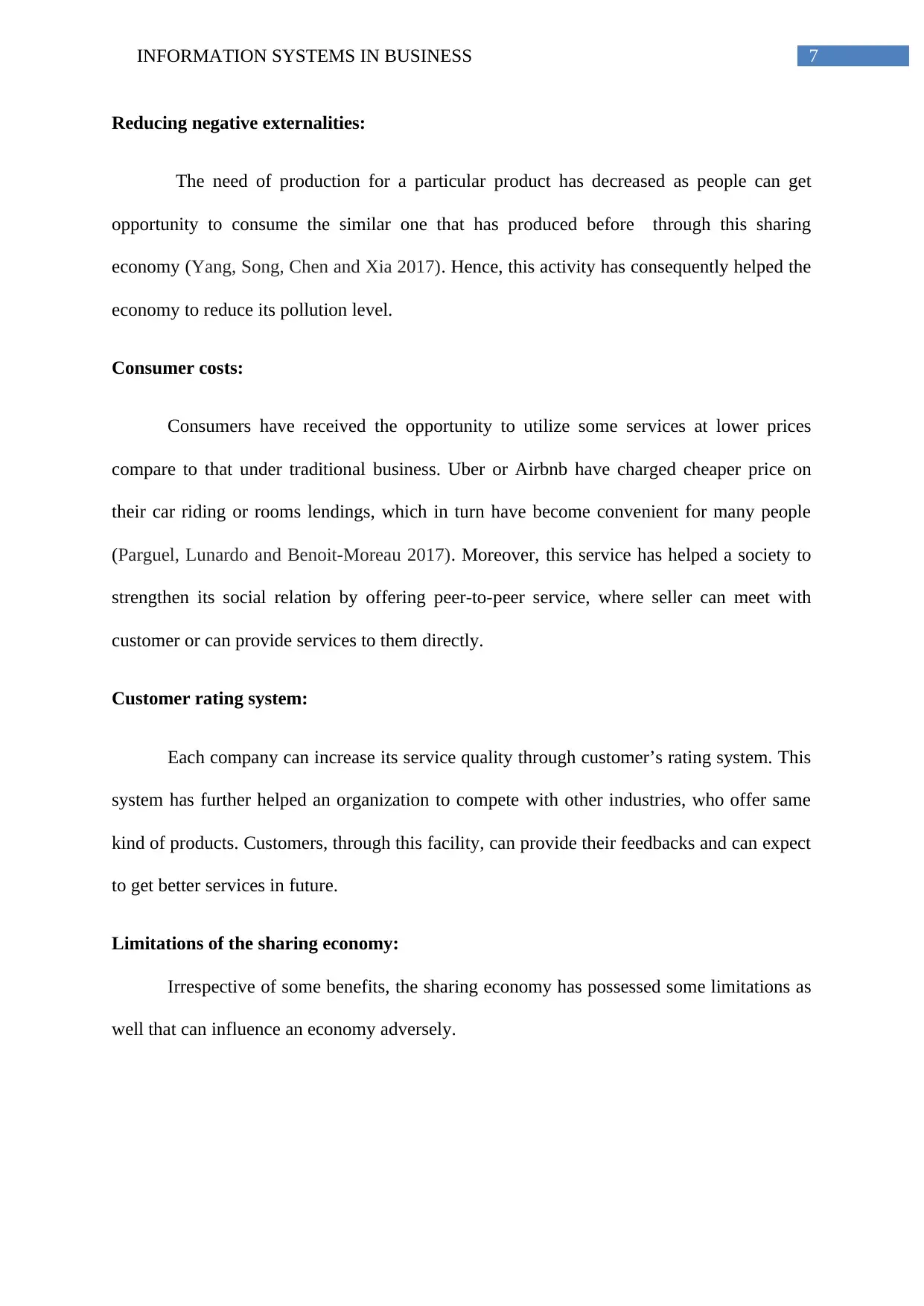
7INFORMATION SYSTEMS IN BUSINESS
Reducing negative externalities:
The need of production for a particular product has decreased as people can get
opportunity to consume the similar one that has produced before through this sharing
economy (Yang, Song, Chen and Xia 2017). Hence, this activity has consequently helped the
economy to reduce its pollution level.
Consumer costs:
Consumers have received the opportunity to utilize some services at lower prices
compare to that under traditional business. Uber or Airbnb have charged cheaper price on
their car riding or rooms lendings, which in turn have become convenient for many people
(Parguel, Lunardo and Benoit-Moreau 2017). Moreover, this service has helped a society to
strengthen its social relation by offering peer-to-peer service, where seller can meet with
customer or can provide services to them directly.
Customer rating system:
Each company can increase its service quality through customer’s rating system. This
system has further helped an organization to compete with other industries, who offer same
kind of products. Customers, through this facility, can provide their feedbacks and can expect
to get better services in future.
Limitations of the sharing economy:
Irrespective of some benefits, the sharing economy has possessed some limitations as
well that can influence an economy adversely.
Reducing negative externalities:
The need of production for a particular product has decreased as people can get
opportunity to consume the similar one that has produced before through this sharing
economy (Yang, Song, Chen and Xia 2017). Hence, this activity has consequently helped the
economy to reduce its pollution level.
Consumer costs:
Consumers have received the opportunity to utilize some services at lower prices
compare to that under traditional business. Uber or Airbnb have charged cheaper price on
their car riding or rooms lendings, which in turn have become convenient for many people
(Parguel, Lunardo and Benoit-Moreau 2017). Moreover, this service has helped a society to
strengthen its social relation by offering peer-to-peer service, where seller can meet with
customer or can provide services to them directly.
Customer rating system:
Each company can increase its service quality through customer’s rating system. This
system has further helped an organization to compete with other industries, who offer same
kind of products. Customers, through this facility, can provide their feedbacks and can expect
to get better services in future.
Limitations of the sharing economy:
Irrespective of some benefits, the sharing economy has possessed some limitations as
well that can influence an economy adversely.
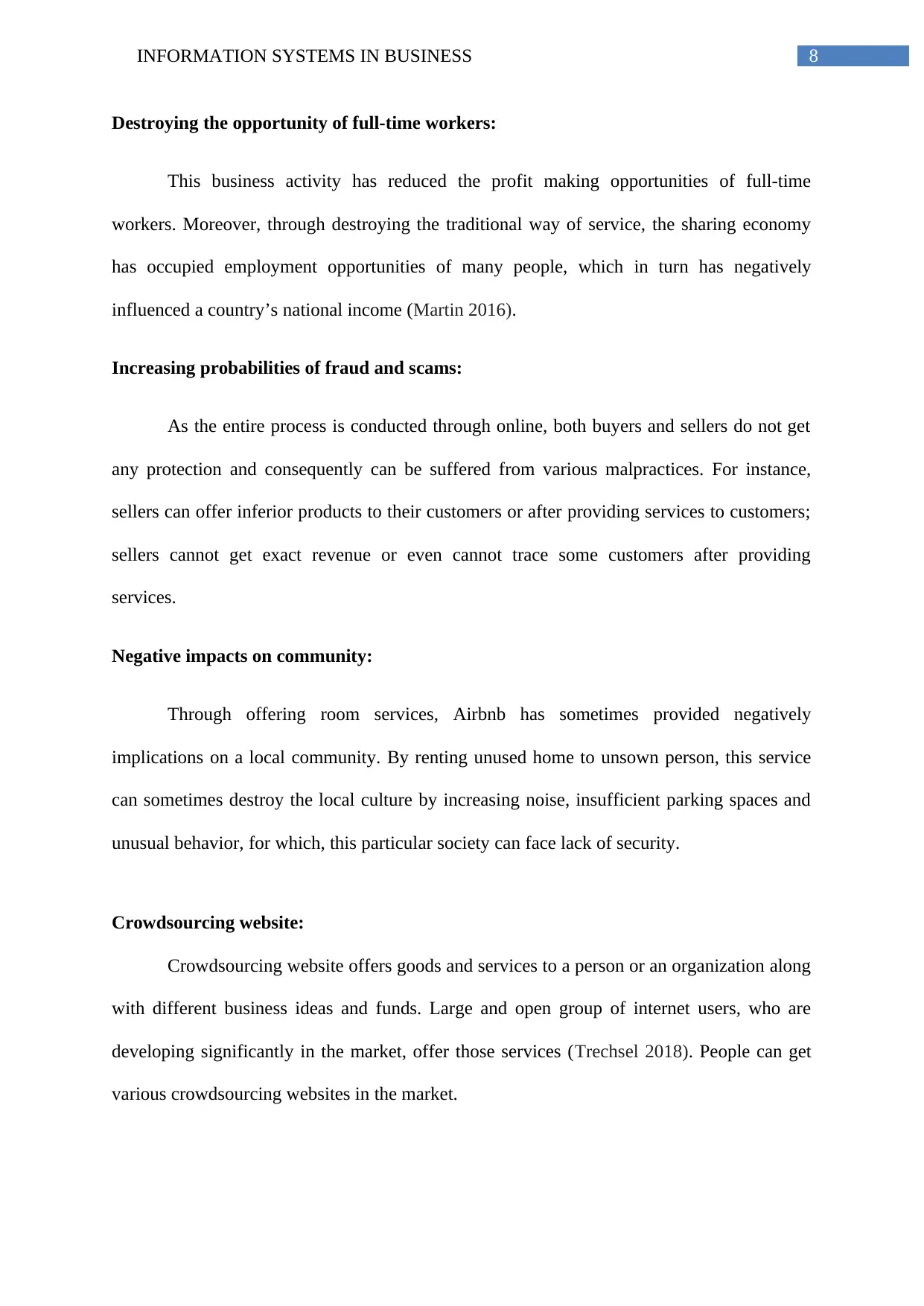
8INFORMATION SYSTEMS IN BUSINESS
Destroying the opportunity of full-time workers:
This business activity has reduced the profit making opportunities of full-time
workers. Moreover, through destroying the traditional way of service, the sharing economy
has occupied employment opportunities of many people, which in turn has negatively
influenced a country’s national income (Martin 2016).
Increasing probabilities of fraud and scams:
As the entire process is conducted through online, both buyers and sellers do not get
any protection and consequently can be suffered from various malpractices. For instance,
sellers can offer inferior products to their customers or after providing services to customers;
sellers cannot get exact revenue or even cannot trace some customers after providing
services.
Negative impacts on community:
Through offering room services, Airbnb has sometimes provided negatively
implications on a local community. By renting unused home to unsown person, this service
can sometimes destroy the local culture by increasing noise, insufficient parking spaces and
unusual behavior, for which, this particular society can face lack of security.
Crowdsourcing website:
Crowdsourcing website offers goods and services to a person or an organization along
with different business ideas and funds. Large and open group of internet users, who are
developing significantly in the market, offer those services (Trechsel 2018). People can get
various crowdsourcing websites in the market.
Destroying the opportunity of full-time workers:
This business activity has reduced the profit making opportunities of full-time
workers. Moreover, through destroying the traditional way of service, the sharing economy
has occupied employment opportunities of many people, which in turn has negatively
influenced a country’s national income (Martin 2016).
Increasing probabilities of fraud and scams:
As the entire process is conducted through online, both buyers and sellers do not get
any protection and consequently can be suffered from various malpractices. For instance,
sellers can offer inferior products to their customers or after providing services to customers;
sellers cannot get exact revenue or even cannot trace some customers after providing
services.
Negative impacts on community:
Through offering room services, Airbnb has sometimes provided negatively
implications on a local community. By renting unused home to unsown person, this service
can sometimes destroy the local culture by increasing noise, insufficient parking spaces and
unusual behavior, for which, this particular society can face lack of security.
Crowdsourcing website:
Crowdsourcing website offers goods and services to a person or an organization along
with different business ideas and funds. Large and open group of internet users, who are
developing significantly in the market, offer those services (Trechsel 2018). People can get
various crowdsourcing websites in the market.
⊘ This is a preview!⊘
Do you want full access?
Subscribe today to unlock all pages.

Trusted by 1+ million students worldwide
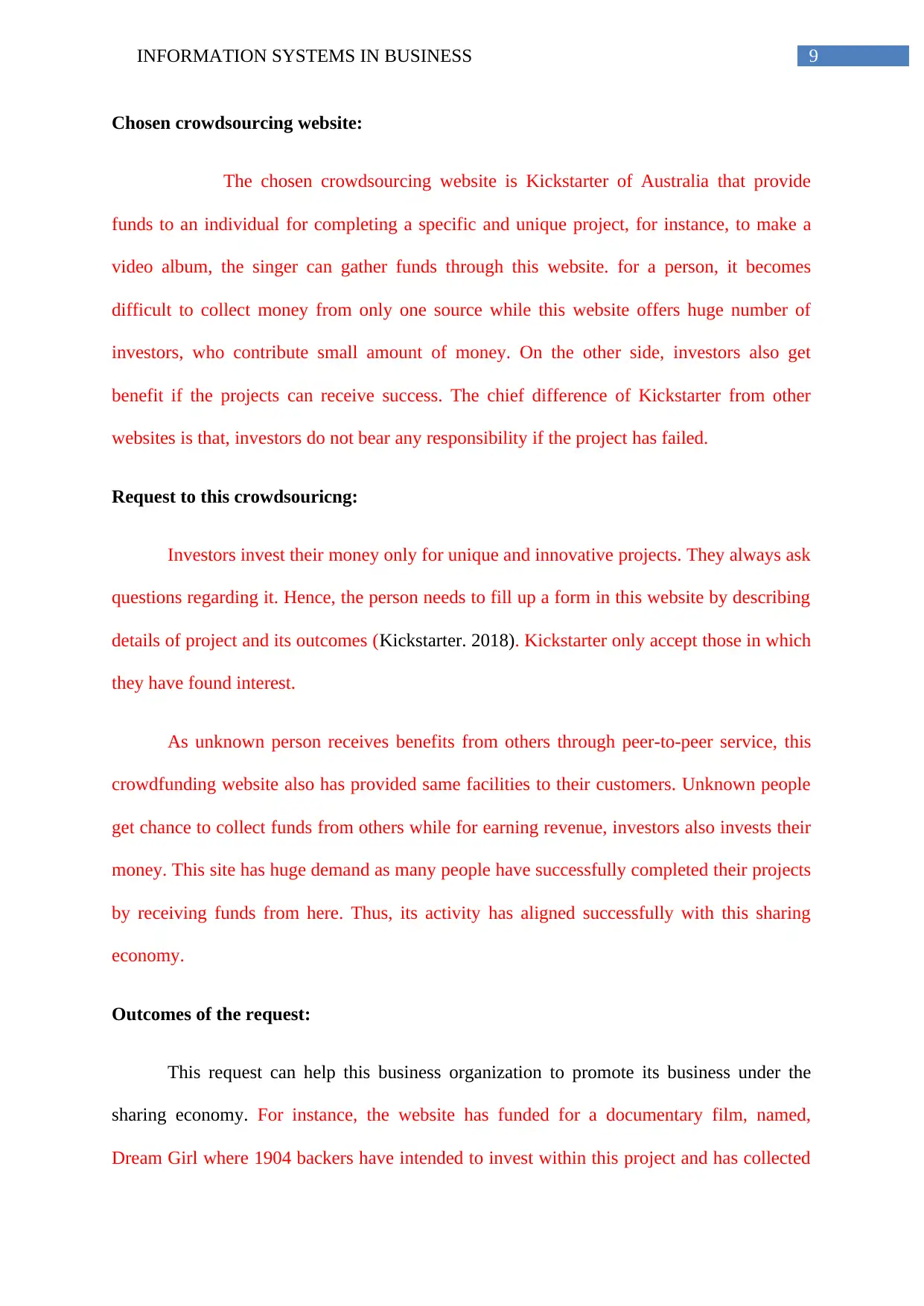
9INFORMATION SYSTEMS IN BUSINESS
Chosen crowdsourcing website:
The chosen crowdsourcing website is Kickstarter of Australia that provide
funds to an individual for completing a specific and unique project, for instance, to make a
video album, the singer can gather funds through this website. for a person, it becomes
difficult to collect money from only one source while this website offers huge number of
investors, who contribute small amount of money. On the other side, investors also get
benefit if the projects can receive success. The chief difference of Kickstarter from other
websites is that, investors do not bear any responsibility if the project has failed.
Request to this crowdsouricng:
Investors invest their money only for unique and innovative projects. They always ask
questions regarding it. Hence, the person needs to fill up a form in this website by describing
details of project and its outcomes (Kickstarter. 2018). Kickstarter only accept those in which
they have found interest.
As unknown person receives benefits from others through peer-to-peer service, this
crowdfunding website also has provided same facilities to their customers. Unknown people
get chance to collect funds from others while for earning revenue, investors also invests their
money. This site has huge demand as many people have successfully completed their projects
by receiving funds from here. Thus, its activity has aligned successfully with this sharing
economy.
Outcomes of the request:
This request can help this business organization to promote its business under the
sharing economy. For instance, the website has funded for a documentary film, named,
Dream Girl where 1904 backers have intended to invest within this project and has collected
Chosen crowdsourcing website:
The chosen crowdsourcing website is Kickstarter of Australia that provide
funds to an individual for completing a specific and unique project, for instance, to make a
video album, the singer can gather funds through this website. for a person, it becomes
difficult to collect money from only one source while this website offers huge number of
investors, who contribute small amount of money. On the other side, investors also get
benefit if the projects can receive success. The chief difference of Kickstarter from other
websites is that, investors do not bear any responsibility if the project has failed.
Request to this crowdsouricng:
Investors invest their money only for unique and innovative projects. They always ask
questions regarding it. Hence, the person needs to fill up a form in this website by describing
details of project and its outcomes (Kickstarter. 2018). Kickstarter only accept those in which
they have found interest.
As unknown person receives benefits from others through peer-to-peer service, this
crowdfunding website also has provided same facilities to their customers. Unknown people
get chance to collect funds from others while for earning revenue, investors also invests their
money. This site has huge demand as many people have successfully completed their projects
by receiving funds from here. Thus, its activity has aligned successfully with this sharing
economy.
Outcomes of the request:
This request can help this business organization to promote its business under the
sharing economy. For instance, the website has funded for a documentary film, named,
Dream Girl where 1904 backers have intended to invest within this project and has collected
Paraphrase This Document
Need a fresh take? Get an instant paraphrase of this document with our AI Paraphraser
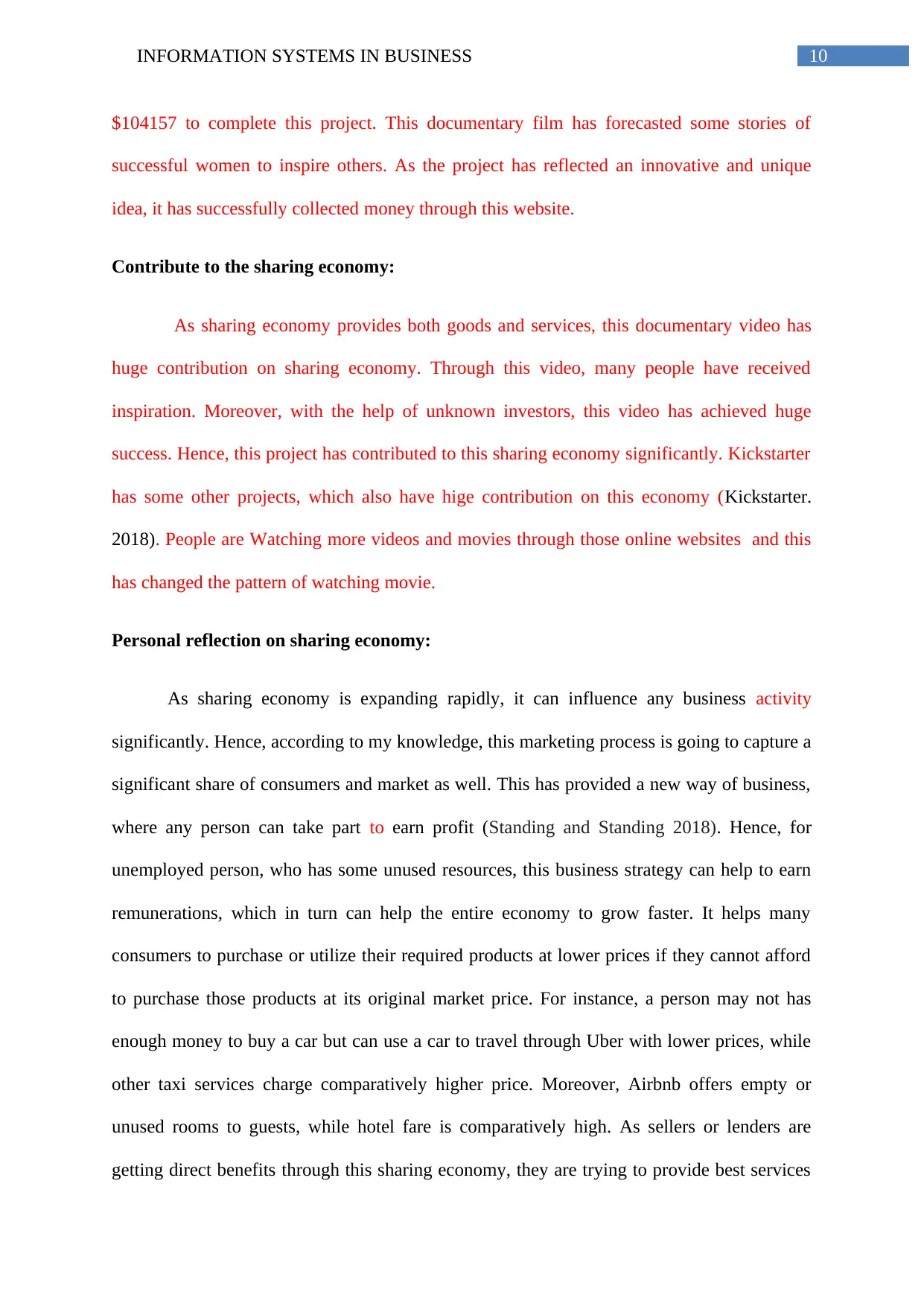
10INFORMATION SYSTEMS IN BUSINESS
$104157 to complete this project. This documentary film has forecasted some stories of
successful women to inspire others. As the project has reflected an innovative and unique
idea, it has successfully collected money through this website.
Contribute to the sharing economy:
As sharing economy provides both goods and services, this documentary video has
huge contribution on sharing economy. Through this video, many people have received
inspiration. Moreover, with the help of unknown investors, this video has achieved huge
success. Hence, this project has contributed to this sharing economy significantly. Kickstarter
has some other projects, which also have hige contribution on this economy (Kickstarter.
2018). People are Watching more videos and movies through those online websites and this
has changed the pattern of watching movie.
Personal reflection on sharing economy:
As sharing economy is expanding rapidly, it can influence any business activity
significantly. Hence, according to my knowledge, this marketing process is going to capture a
significant share of consumers and market as well. This has provided a new way of business,
where any person can take part to earn profit (Standing and Standing 2018). Hence, for
unemployed person, who has some unused resources, this business strategy can help to earn
remunerations, which in turn can help the entire economy to grow faster. It helps many
consumers to purchase or utilize their required products at lower prices if they cannot afford
to purchase those products at its original market price. For instance, a person may not has
enough money to buy a car but can use a car to travel through Uber with lower prices, while
other taxi services charge comparatively higher price. Moreover, Airbnb offers empty or
unused rooms to guests, while hotel fare is comparatively high. As sellers or lenders are
getting direct benefits through this sharing economy, they are trying to provide best services
$104157 to complete this project. This documentary film has forecasted some stories of
successful women to inspire others. As the project has reflected an innovative and unique
idea, it has successfully collected money through this website.
Contribute to the sharing economy:
As sharing economy provides both goods and services, this documentary video has
huge contribution on sharing economy. Through this video, many people have received
inspiration. Moreover, with the help of unknown investors, this video has achieved huge
success. Hence, this project has contributed to this sharing economy significantly. Kickstarter
has some other projects, which also have hige contribution on this economy (Kickstarter.
2018). People are Watching more videos and movies through those online websites and this
has changed the pattern of watching movie.
Personal reflection on sharing economy:
As sharing economy is expanding rapidly, it can influence any business activity
significantly. Hence, according to my knowledge, this marketing process is going to capture a
significant share of consumers and market as well. This has provided a new way of business,
where any person can take part to earn profit (Standing and Standing 2018). Hence, for
unemployed person, who has some unused resources, this business strategy can help to earn
remunerations, which in turn can help the entire economy to grow faster. It helps many
consumers to purchase or utilize their required products at lower prices if they cannot afford
to purchase those products at its original market price. For instance, a person may not has
enough money to buy a car but can use a car to travel through Uber with lower prices, while
other taxi services charge comparatively higher price. Moreover, Airbnb offers empty or
unused rooms to guests, while hotel fare is comparatively high. As sellers or lenders are
getting direct benefits through this sharing economy, they are trying to provide best services
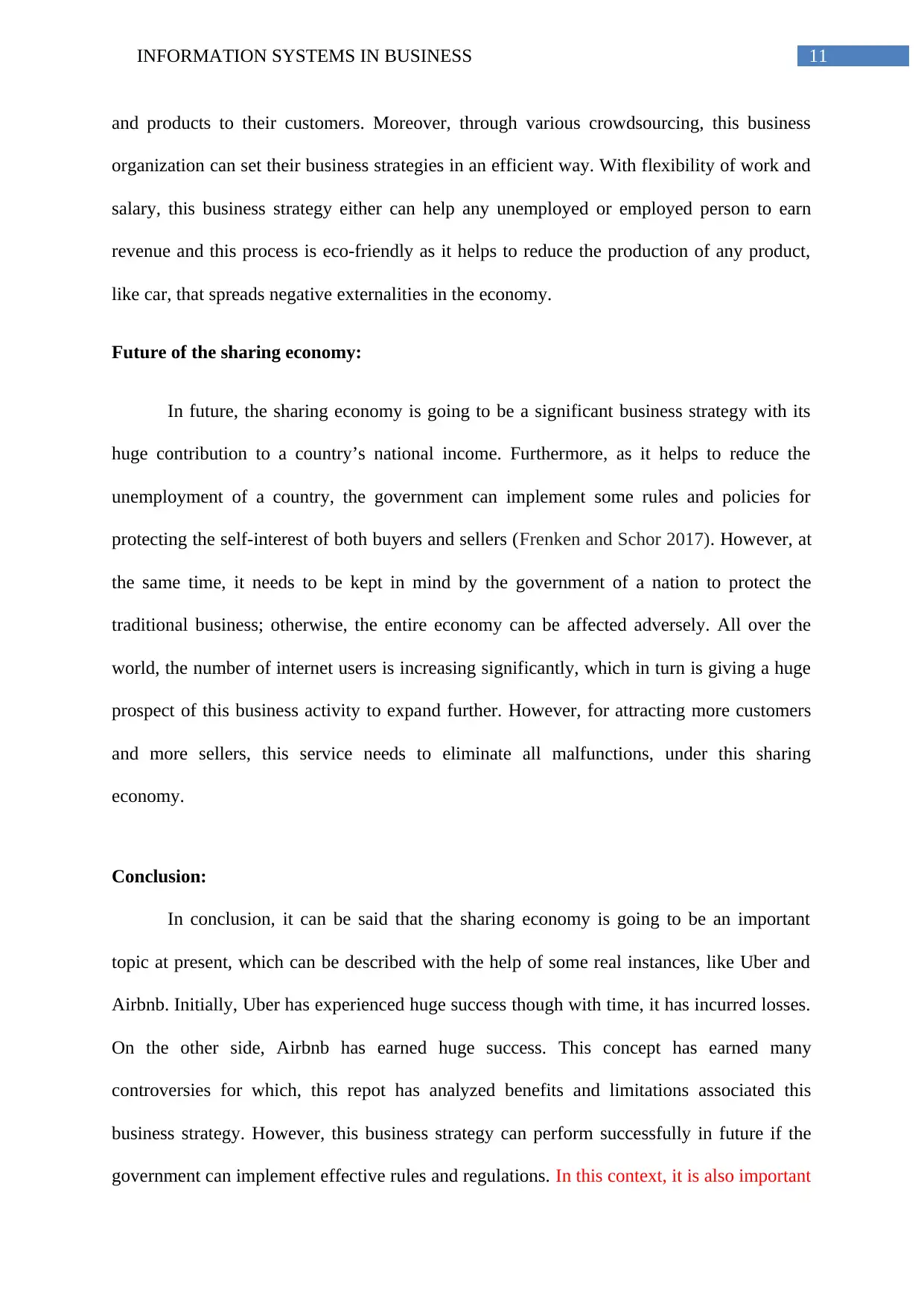
11INFORMATION SYSTEMS IN BUSINESS
and products to their customers. Moreover, through various crowdsourcing, this business
organization can set their business strategies in an efficient way. With flexibility of work and
salary, this business strategy either can help any unemployed or employed person to earn
revenue and this process is eco-friendly as it helps to reduce the production of any product,
like car, that spreads negative externalities in the economy.
Future of the sharing economy:
In future, the sharing economy is going to be a significant business strategy with its
huge contribution to a country’s national income. Furthermore, as it helps to reduce the
unemployment of a country, the government can implement some rules and policies for
protecting the self-interest of both buyers and sellers (Frenken and Schor 2017). However, at
the same time, it needs to be kept in mind by the government of a nation to protect the
traditional business; otherwise, the entire economy can be affected adversely. All over the
world, the number of internet users is increasing significantly, which in turn is giving a huge
prospect of this business activity to expand further. However, for attracting more customers
and more sellers, this service needs to eliminate all malfunctions, under this sharing
economy.
Conclusion:
In conclusion, it can be said that the sharing economy is going to be an important
topic at present, which can be described with the help of some real instances, like Uber and
Airbnb. Initially, Uber has experienced huge success though with time, it has incurred losses.
On the other side, Airbnb has earned huge success. This concept has earned many
controversies for which, this repot has analyzed benefits and limitations associated this
business strategy. However, this business strategy can perform successfully in future if the
government can implement effective rules and regulations. In this context, it is also important
and products to their customers. Moreover, through various crowdsourcing, this business
organization can set their business strategies in an efficient way. With flexibility of work and
salary, this business strategy either can help any unemployed or employed person to earn
revenue and this process is eco-friendly as it helps to reduce the production of any product,
like car, that spreads negative externalities in the economy.
Future of the sharing economy:
In future, the sharing economy is going to be a significant business strategy with its
huge contribution to a country’s national income. Furthermore, as it helps to reduce the
unemployment of a country, the government can implement some rules and policies for
protecting the self-interest of both buyers and sellers (Frenken and Schor 2017). However, at
the same time, it needs to be kept in mind by the government of a nation to protect the
traditional business; otherwise, the entire economy can be affected adversely. All over the
world, the number of internet users is increasing significantly, which in turn is giving a huge
prospect of this business activity to expand further. However, for attracting more customers
and more sellers, this service needs to eliminate all malfunctions, under this sharing
economy.
Conclusion:
In conclusion, it can be said that the sharing economy is going to be an important
topic at present, which can be described with the help of some real instances, like Uber and
Airbnb. Initially, Uber has experienced huge success though with time, it has incurred losses.
On the other side, Airbnb has earned huge success. This concept has earned many
controversies for which, this repot has analyzed benefits and limitations associated this
business strategy. However, this business strategy can perform successfully in future if the
government can implement effective rules and regulations. In this context, it is also important
⊘ This is a preview!⊘
Do you want full access?
Subscribe today to unlock all pages.

Trusted by 1+ million students worldwide
1 out of 16
Related Documents
Your All-in-One AI-Powered Toolkit for Academic Success.
+13062052269
info@desklib.com
Available 24*7 on WhatsApp / Email
![[object Object]](/_next/static/media/star-bottom.7253800d.svg)
Unlock your academic potential
Copyright © 2020–2025 A2Z Services. All Rights Reserved. Developed and managed by ZUCOL.




